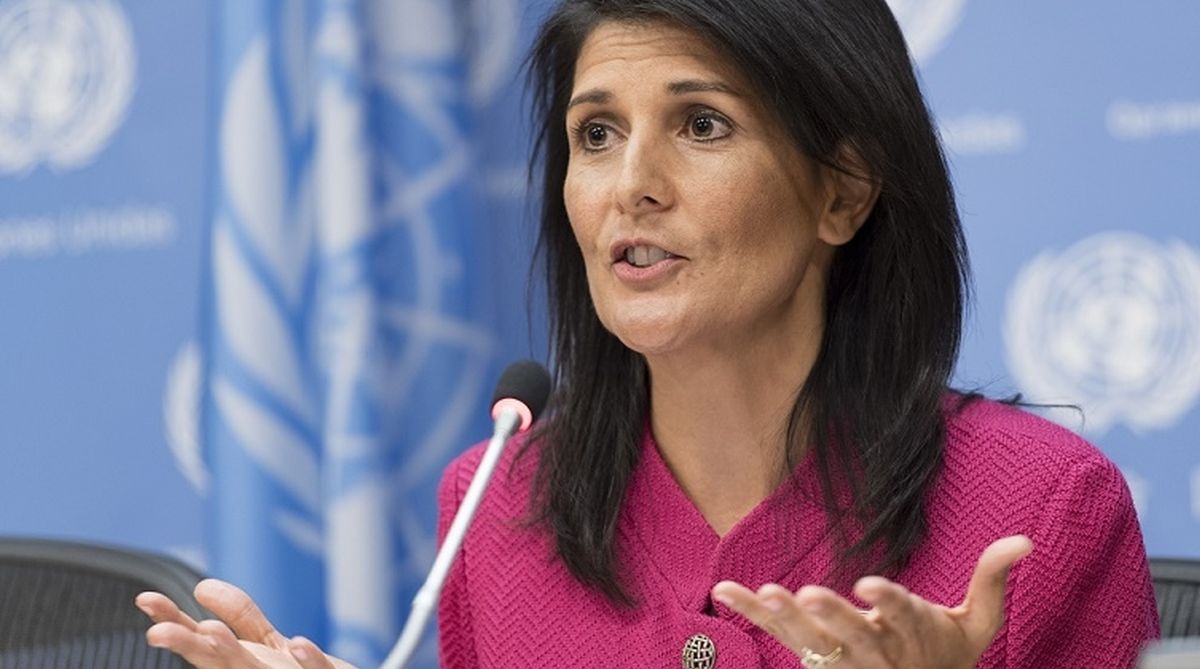UNSC president sees hope for ‘breakthrough’ in efforts to stop Ukraine war
Security Council President Christina Markus Lassen sees hope for a “breakthrough” in efforts to stop the Ukraine war.
Talks between Haley and Indian officials could include a host of topics like India-US strategic ties and major global developments

Nikki Haley (Photo: UN/IANS)
US Ambassador to the United Nations Nikki Haley will be on a three-day visit to India from Tuesday to meet high-ranking Indian officials to discuss a wide range of issue, including UN reforms and the situation in Afghanistan.
Her visit comes days before External Affairs Minister Sushma Swaraj and Defence Minister Nirmala Sitharaman travel to Washington for the inaugural ‘2+2’ dialogue with US Secretary of State Michael Pompeo and Secretary of Defence James Mattis on 6 July.
Advertisement
Haley would be in India between June 26-28 to have interactions to underscore Washington’s shared values and strong alliance with the people of India, an announcement by the US side said. Haley is also expected to call on Prime Minister Narendra Modi during the visit.
Advertisement
She will also deliver remarks to a group of business and government leaders, students, and civil society on advancing US-India relations.
Talks between Haley, the highest ranking Indian-American in the Donald Trump administration, and Indian officials could include a host of topics like India-US strategic ties and major global developments.
Haley has emerged as a high-profile official of President Donald Trump’s administration laying down his hardline policy at the UN.
Last week she announced the US was withdrawing from the UN Human Rights Council (HRC) and has been leading the charge against Iran, Russia and Syria, while demanding that the UN reform and economise.
She also paved the way for Trump’s North Korean diplomatic initiative that led to the his summit with Kim Jong-un by increasing international pressure on Pyongyang, especially getting China to join the tough sanctions.
A rising star of the Republican Party, Haley has chartered her own course, at times crtiticising Trump.
While that has increased her political viability with some seeing her as a potential presidential candidate, she has also been the victim of personal hatred from some Democrats — including Indians — for being a Republican, even though she broke the gender and colour barriers when she was elected governor of South Carolina in 2010.
She has been the victim of virulent rumour-mongering by adversaries attacking her personally.
India has moved away from the hostile third world positions that pitched it against the US in the UN and work together in areas like countering terrorism, but differences have opened up in many areas.
New Delhi and Washington are far apart on approaches to Iran, with Trump cancelling the nuclear deal with Tehran and threatening stronger sanctions and India preferring close economic ties and building a bridge to Afghanistan through Iran.
India will also not commit to a front against Russia and Syria, or totally back the US policy on Israel, which has seen Washington isolated at the UN.
While India will not take the extreme step of breaking with the HRC, where unlike the US it is not a current member, it shares Washington’s scepticism of the UN human rights apparatus.
(With inputs from IANS)
Advertisement